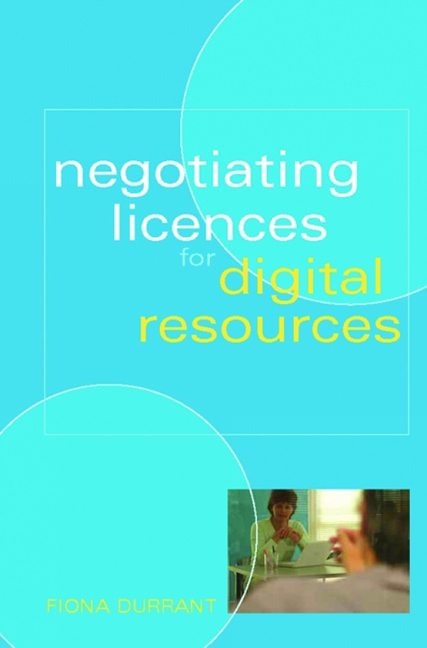Book contents
- Frontmatter
- Contents
- Acknowledgements
- Introduction
- 1 Preparation
- 2 The contract
- 3 Negotiation
- 4 Staff development and communicating negotiation outcome
- 5 Conclusion
- References and further reading
- Appendix 1 Frequently asked questions
- Appendix 2 Negotiation timeline
- Appendix 3 Personal negotiation experience
- Index
- Frontmatter
- Contents
- Acknowledgements
- Introduction
- 1 Preparation
- 2 The contract
- 3 Negotiation
- 4 Staff development and communicating negotiation outcome
- 5 Conclusion
- References and further reading
- Appendix 1 Frequently asked questions
- Appendix 2 Negotiation timeline
- Appendix 3 Personal negotiation experience
- Index
Summary
Negotiating Licences for Digital Resources has been written as a practical guide on to how to get the best deal for online subscriptions. The processes outlined in this book can be applied to a wide range of electronic subscriptions, ranging from e-journals to multi-modular databases. There are practical tips and guidance on what to focus upon during the process of the negotiation and, most importantly, what preparation is needed to ensure you gather the necessary amount of information to achieve the best outcome. The timing of this advance preparation is one of the skills that enables the negotiator to feel in control. Appendix 2 outlines the key considerations in the timing process and offers a sample timeline to help your planning and preparation. The intention throughout this book has been to move logically from understanding your organization's needs, to making the contract more understandable, through to the actual negotiation process in written or face-to-face scenarios.
A lot of what has been written may already be part of your professional experience, but you may not have realized how much you already knew. A book cannot have all the answers, of course, but hopefully there are at least some starting points here. As you get involved in more negotiations, make a note of what works (and what does not work!) and add to this book. There are some pages at the very end where it is possible to make personal notes (see Appendix 3).
The reasons why someone might buy or read this book are not hugely varied. They are probably interested in improving their negotiation skills and in finding answers to questions about the negotiation process and what can really be achieved. It is hoped that this book has addressed a lot of these questions but, as an additional aid, Appendix 1 contains some frequently asked questions (FAQs) that are designed to draw together some of the tips, ideas and suggestions made throughout the book. They are easily digestible and can be used as a quick reference guide where speed is of the essence. They are also written in a different format to complement the structure of the rest of the book. The selection consists of questions from both the publisher and the purchaser, although the majority are purchaser questions as it is often the purchaser who is the least experienced negotiatior.
- Type
- Chapter
- Information
- Negotiating Licences for Digital Resources , pp. 127 - 130Publisher: FacetPrint publication year: 2006

